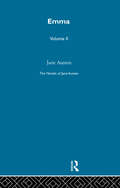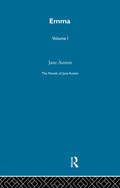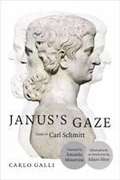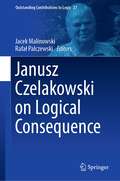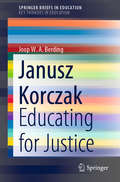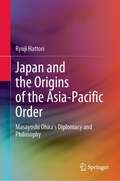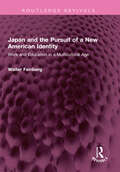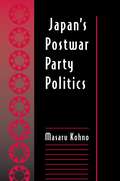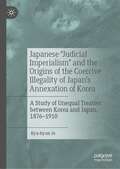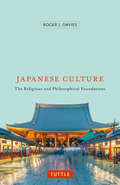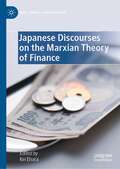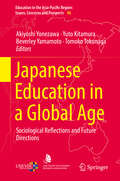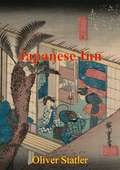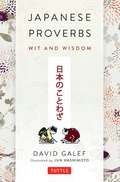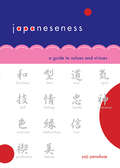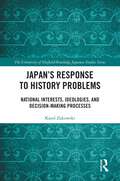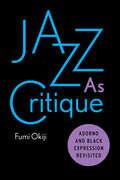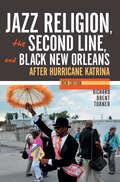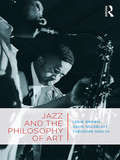- Table View
- List View
Jane Austen: The Original Edition Of 1901 (The\black Cat Ser.)
by Jane Austen David GilsonFirst published in 1995. Here, republished for the first time,is the first edition text of Jane Austen's much loved classic masterpieces. A rare and inaccessible resource for most scholars, the first editions are unique documents in the history of English literature.This text includes Volume 2 of 'Emma'.
Jane Austen: The Original Edition Of 1901 (The\black Cat Ser.)
by Jane Austen David GilsonFirst published in 1995. Here, republished for the first time,is the first edition text of Jane Austen's much loved classic masterpieces. A rare and inaccessible resource for most scholars, the first editions are unique documents in the history of English literature. This includes volume 1 of Emma.
Janus's Gaze: Essays on Carl Schmitt
by Adam Sitze Amanda Minervini Carlo GalliFirst published in Italian in 2008 and appearing here in English for the first time, Janus's Gaze is the culmination of Carlo Galli's ongoing critique of the work of Carl Schmitt. Galli argues that Schmitt's main accomplishment, as well as the thread that unifies his oeuvre, is his construction of a genealogy of the modern that explains how modernity's compulsory drive to achieve order is both necessary and impossible. Galli addresses five key problems in Schmitt's thought: his relation to the state, the significance of his concept of political theology, his readings of Machiavelli and Spinoza, his relation to Leo Strauss, and his relevance for contemporary political theory. Galli emphasizes the importance of passing through Schmitt's thought--and, more important, beyond Schmitt's thought--if we are to achieve insight into the problems of the global age. Adam Sitze provides an illuminating introduction to Schmitt and Galli's reading of him.
Janusz Czelakowski on Logical Consequence (Outstanding Contributions to Logic #27)
by Jacek Malinowski Rafał PalczewskiThis book is dedicated to the life and work of logician Janusz Czelakowski on the topic of logical consequence. It consists of three parts – a biography, a survey and research sections. The volume begins with an autobiographic chapter by Janusz Czelakowski followed by a historical chapter written by Jacek Malinowski. The survey section forms the backbone of the volume with each chapter covering one of Janusz Czelakowski’s results. They focus on his results in the area of logical consequence, demonstrate how his results influenced following research, and presents potential future results, problems and applications. This volume is of interest to logicians and mathematicians.
Janusz Korczak: Educating for Justice (SpringerBriefs in Education)
by Joop W. BerdingThis book presents the educational view and practice of the Polish-Jewish doctor, writer and pedagogue Janusz Korczak (Warsaw 1878–Treblinka 1942). In the authors' reconstruction five core elements stand out: respect for every child; participation; justice; dialogue as expression and communication; self-awareness and reflection on the part of the educator.These elements do not constitute a well-rounded theory or philosophy, but are part of many stories of living together with children, in Korczak’s case orphans. Korczak, actively involving the children themselves, organized this life in such a way that justice ruled. He is the pedagogue of narrativity and of democratic upbringing. Korczak explored many, and today still challenging ways of participative education.The book shows that besides the now domineering positivist outlook on education, with its technocratic language and stress on output, standards, testing, etc., another language is possible, one that is more practice-based and that teachers will relate to immediately: love for children, a pedagogical ethos, and seeking ways to live together in a just way.
Japan and the Origins of the Asia-Pacific Order: Masayoshi Ohira's Diplomacy and Philosophy
by Ryuji HattoriThis book analyzes Ohira's ideology, philosophy, and actions as a politician and a minister, based on primary sources from Japan and the USA, and makes a significant contribution to the field of Japanese political and diplomatic history. This book is the first critical biography to chart Masayoshi Ohira’s life and work, with a focus on his political philosophy, and how he sought to create a new order in the Asia-Pacific region, framing a plan for solidarity across the Pacific Rim. If a statesman is a politician who has made diplomacy their life's work, then Ohira can be regarded as the first Japanese statesman of the modern era. While this ambition remained unfulfilled, Ohira's involvement in foreign policy was long and intensive—and highly influential—on the region. One of only two postwar prime ministers to have served as foreign minister for two terms, he attempted to balance the pursuit of a new order in the Pacific Rim with Asian diplomacy and focused on cooperation with the USA without becoming overly reliant on it. With the new availability of original documents decades after his death, this book has become possible, enabling the author to systematically follow and record Ohira's diplomatic vision. Combining history, political philosophy, political science, and international relations, this book is of appeal to history scholars and students of Japan, as well as of the foreign relations of countries such as the USA, China, and Korea.
Japan and the Pursuit of a New American Identity: Work and Education in a Multicultural Age (Routledge Revivals)
by Walter FeinbergFirst published in 1993, Japan and the Pursuit of a New American Identity is a sophisticated analysis of the mission of education in a multicultural age. Arguing that American education has been too long constrained by conservative discourse – which positions schools and students as weapons in an international competition with the Japanese – author Walter Feinberg assesses the cultural and philosophical limits of conservative vision as popularized by exponents Allan Bloom and E. D. Hirsch. Feinberg then develops a vision of education which accommodates the growing cultural diversity of American society and American schools. At the heart of Feinberg’s study is a unique philosophical analysis of Japanese and American attitudes towards work and education. Through a series of sensitively developed interview with American and Japanese workers, managers, parents, and teachers who have experienced life in one another’s culture, he examines the implications of our profound cultural differences with the Japanese for the development of a new American, multicultural identity. This book will be of interest to students of education, pedagogy, history and public policy.
Japan's Postwar Party Politics
by Masaru KohnoIn this sophisticated theoretical work, Masaru Kohno presents a systematic reexamination of the evolution of party politics in Japan since the end of the second World War. Because of the long one-party dominance by the Liberal Democratic Party, Japan's parliamentary democracy has often been viewed as unique in the developed world, and most of the existing studies of Japanese party politics have addressed such determinants as its political culture, historical background, and socio-ideological cleavages. According to the author, these explanations do not adequately account for some of the most important changes that took place in Japanese party politics during the postwar period. This study advances an alternative set of interpretations based on a microanalytic approach that highlights the incentive and bargaining power of individual political actors, and their competitive and strategic behavior under existing institutional constraints. According to Kohno, the evolution of political life in postwar Japan depends on the same factors that are acknowledged to be at work in other industrialized nations. He reveals, through detailed case studies of government formation processes and statistical examinations of candidate nomination patterns, that the microanalytic approach can establish forward-looking and internally consistent interpretations of the postwar development of Japanese party politics. Because Japan has usually been treated as a country of unique cultural, historical, and societal characteristics, the analyses of this study point to the broader applicability of the microanalytic approach in the field of comparative politics, especially for the exploration of party competition in advanced industrial democracies.
Japanese "Judicial Imperialism" and the Origins of the Coercive Illegality of Japan's Annexation of Korea: A Study of Unequal Treaties between Korea and Japan, 1876–1910
by Kyu-hyun JoThis book explores the legacy of the Japanese empire in Korea, asking how colonialism arose as a legal idea. What was the legal process behind the establishment of colonialism as Japan's prime strategy towards Korea since the late 19th century? By addressing such questions, it is not only possible to address how Japanese colonialism in Korea was born, but also address how the process behind the making of colonialism as a judicial and legal project was illegal from its origination. As East Asia grapples with a new generation of power politics, these sober reflects lend an important historical context to the struggles of the present.
Japanese Culture: The Religious and Philosophical Foundations
by Roger J. DaviesJapanese Culture: The Religious and Philosophical Foundations takes readers on a detailed and thoroughly researched journey through Japan's cultural history.This much-anticipated sequel to Roger Davies's best-selling The Japanese Mind provides a comprehensive overview of the religion and philosophy of Japan. This cultural history of Japan explains the diverse cultural traditions that underlie modern Japan and offers readers deep insights into Japanese manners and etiquette. Davies begins with an investigation of the origins of the Japanese, followed by an analysis of the most important approaches used by scholars to describe the essential elements of Japanese culture. From there, each chapter focuses on one of the formative elements: Shintoism, Buddhism, Taoism, Zen, Confucianism, and Western influences in the modern era.Davies concludes each chapter with extensive endnotes along with thought-provoking discussion activities, making this volume ideal for individual readers and for classroom instruction. Anyone interested in pursuing a deeper understanding of this complex and fascinating nation will find Davies's work an invaluable resource.
Japanese Design
by Patricia J. GrahamWhat exactly is the singular attraction of Japanese design? And why does it speak so clearly to so many people all over the world? The Japanese sensibility often possesses an intuitive, emotional appeal, whether it's a silk kimono, a carefully raked garden path, an architectural marvel, a teapot, or a contemporary work of art. This allure has come to permeate the entire culture of Japan-it is manifest in the most mundane utensil and snack food packaging, as well as in Japanese architecture, and fine art. In Japanese Design, Asian art expert and author Patricia J. Graham explains how this aesthetic based in fine craftsmanship and simplicity developed. Her unusual, full-color presentation reveals the Japanese design aesthetic in an absorbing way, using a combination of insightful explanations and more than 160 stunning photos. Focusing upon ten elements of Japanese design, Graham explores how visual qualities, the cultural parameters and the Japanese religious traditions of Buddhism and Shinto have impacted the appearance of its arts. Japanese Design is a handbook for the millions of us who have felt the special allure of Japanese culture, crafts, and art. Art and design fans and professionals have been clamoring for this-a book that fills the need for an intelligent, culture-rich overview of what Japanese design is and means.
Japanese Discourses on the Marxian Theory of Finance (Marx, Engels, and Marxisms)
by Kei EharaThis edited volume traces the development of the Marxian theory of finance in Japan. Japanese Marxists have long been engaged in this field of study, yet their achievements are hardly known in other languages. Japanese Discourses on the Marxian Theory of Finance brings together in English for the first time six core essays essential to the understanding of the history and development of Japanese Marxian economics. Part I considers the so-called Uno-Miyake debate, which shaped the direction of the research in postwar Japan. Part II includes the three core essays influenced by Uno, including an essay by Shigekatsu Yamaguchi, who introduced a new method to systematically deal with “credit creation” which must be duly taken into consideration if scholars are to analyze today’s “financialization." Finally, the last two essays follow from Yamaguchi’s influential theory to consider the relation of banking with the capital market to complete the theory of finance in Marxian economics.
Japanese Education in a Global Age: Sociological Reflections and Future Directions (Education in the Asia-Pacific Region: Issues, Concerns and Prospects #46)
by Akiyoshi Yonezawa Yuto Kitamura Tomoko Tokunaga Beverley YamamotoThis book highlights recent education research on Japan based on sociological and other related approaches to historical developments and accomplishments. Written primarily by members of the Japan Society of Educational Sociology, it brings to light concerns and viewpoints that have grown out of the Japanese educational context. By focusing on uniquely Japanese educational research phenomena, the book offers international readers new insights and contributes to the international debate on education. It may help sociologists and social scientists outside Japan gain a deeper understanding of ongoing changes in education in Japan as well as its historical and structural contexts.
Japanese Flower Arrangement: A Complete Primer
by Ellen G. AllenThere is something of the artist in each of us. Some of us find expression in painting, poetry, or sculpture, some in landscape gardening. With talent and facility, expression in these art forms is Satisfying. <P><P>And this is true also of flower arranging, an ancient art that can express a thought or mood and in a sense combine the expression of severnl other media. Yet special talent for flower arranging is not essential. The 'feeling' for it is engendered by the practice of it!' With these words Ellen Gordon Allen begins the introduction to her eminently practical primer of Japanese flower arrangement, which is here being offered in a new revised edition. As a certified teacher (Oharn school)and a very successful one, Mrs. Allen is well qualified to present her subject.The purpose of her book is fourfold: to increase the skill of all who love to arrange flowers to provide a more comprehensive understanding of the Japanese art of flower arrangement; to help students when no teacher is available; andto provide a medium of instruction among the many, often confusing, schools of Japoncse flower arrangement. It is Mrs. Allen's hope that the primer will serve as a practical handbook for beginners and that it will dispel the aura ofmystery that seems to surround the subject. To this end, she has made her instructions as elementary as possible. The few fundamental rules of Japanese flower arrangement and the various techniques are presented in a simple manner.Wherever possible, English equivalents have been substituted for Japanese terms. Each lesson sketches, photographs, and diagrams which clearly show the student what to do in working toward completion of the arrangement. Although Mrs. Allen teaches principally the methods of the Ohara school for the moribana and heika styles and the methods of the Saga school for the seika style, her book is also a compilation of information from the Sogetsu, the Ikenobo, the Sho-fu·ryu, and other famous schools in Japan. She has selected what she considers most practical for use in the American or other foreign setting. By using the slep-by-step methods outlined in the 14 well-organized lessons, the Rowerarrangementstudent will not only be able to learn rapidly but will also experience the pleasure of making genuine progress in an art that provides an endless source of enjoyment. And, as Mrs. A1len expresses it, "it is the enjoyment of making flower arrangements that I want particularly to stress. Learn the fundamentalsand you will enjoy their application, sharing your pleasure with others who will marvel at your skill in arranging flowers."
Japanese Ikebana for Every Season
by Noboru Murata Yuji Ueno Rie ImaiThe true meaning of Ikebana-the traditional Japanese art of flower arrangement-is the ability to take a few beautiful flowers and plans and tastefully present them in very simple containers to decorate your home. Whether for Mother's Day, Valentine's Day, or a special birthday or anniversary-Japanese Ikebana for Every Season simplifies and demystifies this ancient art by presenting 53 elegantly simple arrangements that anyone can create at anytime at home.The key to good Ikebana arrangements is to understand a few very simple principles-like the idea of mitate-seeing old things with new eyes, as well as learning a few very easy techniques of flower stabilization and how to support plants and flowers inside a vase or container. Using simple, common flowers and plants from your garden, from a nearby field or forest, or from your local florist-you can easily create these lovely Ikebana in just a few minutes if you know how.Authors Rie Imai and Yuji Ueno explain how to select the flowers and the containers by simply using things that are already around you-and then they show you how to turn them into something special. The basic instructions in the book cover a wide range of styles that encourage readers to use their own creativity rather than copying traditional and highly technical Ikebana design concepts.No matter what time of year it is and regardless of your taste or budget-the arrangements in this book will lend a touch of Japanese elegance to your home!
Japanese Inn: A Reconstruction Of The Past
by Oliver StatlerThe beguiling story of the Minaguchi-ya, an ancient inn on the Tokaido Road, founded on the eve of the establishment of the Tokugawa shogunate. Travellers and guests flow into and past the inn -- warriors on the march, lovers fleeing to a new life, pilgrims on their merry expeditions, great men going to and from the capital. The story of the Minaguchi-ya is a social history of Japan through 400 years, a ringside seat to some of the most stirring events of a stirring period.'Statler has created a strangely beautiful book that succeeds in conveying intact not only a great deal of its history but the mood of that land. The result is sheer delight. Japanese Inn is the work of a master craftsman; it is so well conceived that the narrative moves from past to present in the same paragraph without the slightest confusion to the reader; it is so well written that only in retrospect is one aware of its remarkable flawless style. Through the author's particular magic, the stories unfold as one narrative, as beautifully and memorably as the unrolling of a long Japanese scroll.'--CURT GENTRY'The reader learns much of Japan's past -- and, as is inevitable in a study of that country, of present-day Japanese as well. Mr Statler's prose succeeds in evoking the pageantry of the past in the brilliant color of the kabuki stage. Nothing seems to have been overlooked by the author. Mr Statler's book is Japanese history made easy, and grand entertainment.'-- NEW YORK TIMES BOOK REVIEW'Much of it is told in fictional form. Some of the episodes have come out of family annals and memories, some from the records of the temple; some are imagined; but all could have happened ... Mr Statler has told the story vividly and with sympathy. It moves. It has the authentic feel of Japan.'--INTERNATIONAL HERALD TRIBUNE
Japanese Poetry and its Publics: From Colonial Taiwan to Fukushima (Postcolonial Politics)
by Dean Anthony BrinkThis book aims to explore precisely how modern Japanese poetry has remained central to public life in both Japan and its former colony of Taiwan. Though classical Japanese poetry has captivated the imagination of Asian studies scholars, little research has been conducted to explore its role in public life as a discourse influential in defining both the modern Japanese empire and contemporary postcolonial negotiations of identity. This book shows how highly visible poetry in regular newspaper columns and blogs have in various historical situations in Japan and colonial Taiwan contested as well as promoted diverse colonial imaginaries. This poetry reflects both contemporary life and traditional poetics with few counterpoints in Western media. Methodologically, this book offers a defense of the public influence of poetry, each chapter enlisting a wide range of social and media theorists from Japan, Europe, and North America to explore specific historical moments in an original recasting of intertextuality as a vital feature of active inter-evental material engagements. In this book, rather than recite a standard survey of literary movements and key poets, the approach taken is to examine uses of poetry shown not only to support colonialism and imperialism, emerging objectionable forms of exploitation as well as the destruction of ecologies (including old-growth forests in Taiwan and the Fukushima Disaster), but also to present a medium of resistance, a minor literature for registering protest, forming transnational affiliations, and promoting grass-roots democracy. The book is based on years of research and fieldwork partially in conjunction with the production of a documentary film, Horizons of the Rising Sun: Postcolonial Nostalgia and Politics in the Taiwan Tanka Association Today (2017).
Japanese Proverbs
by David Galef Jun Hashimoto"Destroy a nation, but its mountains and rivers remain."--Japanese proverbThis is a collection of 200 Japanese proverbs with illustrations and explanations for each saying.Go beyond speaking Japanese-peek into the soul of Japan. Japanese Proverbs: Wit and Wisdom is a delightfully illustrated compilation of traditional Japanese proverbs and sayings. Some of the classic Japanese quotes and quotations, like "Fall down seven times, get up eight", capture the dogged perseverance of the Japanese heart. Others, such as "A red lacquer dish needs no decoration" illuminate both a universal truth and Japan's unique, aesthetic traditions. Japanese Proverbs: Wit and Wisdom has proverbs of great cultural significance as well as proverbs on matters of daily life and customs.Pleasing to expert and new-comer alike, the 200 traditional proverbs in this unique collection are presented in Japanese script (kana and kanji) and romanized (romaji) form, along with direct English translations. Similar proverbs are given from English, and the sumi-e style ink drawings are a delight in their own right.You'll speak Japanese with the verve and nuance of a native when you use these apt and witty expressions.
Japanese Proverbs
by David Galef Jun Hashimoto"Destroy a nation, but its mountains and rivers remain."--Japanese proverbThis is a collection of 200 Japanese proverbs with illustrations and explanations for each saying.Go beyond speaking Japanese-peek into the soul of Japan. Japanese Proverbs: Wit and Wisdom is a delightfully illustrated compilation of traditional Japanese proverbs and sayings. Some of the classic Japanese quotes and quotations, like "Fall down seven times, get up eight", capture the dogged perseverance of the Japanese heart. Others, such as "A red lacquer dish needs no decoration" illuminate both a universal truth and Japan's unique, aesthetic traditions. Japanese Proverbs: Wit and Wisdom has proverbs of great cultural significance as well as proverbs on matters of daily life and customs.Pleasing to expert and new-comer alike, the 200 traditional proverbs in this unique collection are presented in Japanese script (kana and kanji) and romanized (romaji) form, along with direct English translations. Similar proverbs are given from English, and the sumi-e style ink drawings are a delight in their own right.You'll speak Japanese with the verve and nuance of a native when you use these apt and witty expressions.
Japanese Proverbs
by David Galef Jun Hashimoto"Destroy a nation, but its mountains and rivers remain."--Japanese proverbThis is a collection of 200 Japanese proverbs with illustrations and explanations for each saying.Go beyond speaking Japanese-peek into the soul of Japan. Japanese Proverbs: Wit and Wisdom is a delightfully illustrated compilation of traditional Japanese proverbs and sayings. Some of the classic Japanese quotes and quotations, like "Fall down seven times, get up eight", capture the dogged perseverance of the Japanese heart. Others, such as "A red lacquer dish needs no decoration" illuminate both a universal truth and Japan's unique, aesthetic traditions. Japanese Proverbs: Wit and Wisdom has proverbs of great cultural significance as well as proverbs on matters of daily life and customs.Pleasing to expert and new-comer alike, the 200 traditional proverbs in this unique collection are presented in Japanese script (kana and kanji) and romanized (romaji) form, along with direct English translations. Similar proverbs are given from English, and the sumi-e style ink drawings are a delight in their own right.You'll speak Japanese with the verve and nuance of a native when you use these apt and witty expressions.
Japaneseness: A Guide to Values and Virtues
by Yoji YamakuseThis book looks at the core life concepts and shared values that historically and culturally define the quality of "being Japanese. " Among these are reverence, love of nature, group loyalty, hierarchical respect, passion for detail, belief in learning, formality, and acceptance of change. How can Western analogues of these Japanese virtues help us improve our own societies and cultivate inner strength, mindfulness, and long-lasting relationships at home and the workplace? This stimulating exploration of an alternative ethics and humanism is a provocative workbook for "decluttering the spirit. " Yoji Yamakuse is a Tokyo-based consultant on personnel management, staff training, and development of joint projects in cross-cultural environments.
Japan’s Response to History Problems: National Interests, Ideologies, and Decision-Making Processes (The University of Sheffield/Routledge Japanese Studies Series)
by Karol ZakowskiThis book examines the decision-making processes behind the formulation and evolution of the Japanese government’s official stance regarding diplomatic problems connected with the history of Japan’s territorial expansionism in East Asia.Based on neoclassical realism and historical institutionalism, this book analyzes to what extent Japan’s reaction to history problems complied with external pressures and to what extent it was modified by domestic-level variables. Particular attention is paid to the ideological leanings of key decision makers as well as their position against veto players, such as ruling party decision-making bodies, Liberal Democratic Party (LDP) factions, cabinet members, coalition parties, and ministerial bureaucrats. Through four case studies – apologies for the war of aggression, a history textbook screening system, prime ministerial visits to the Yasukuni Shrine, and the “comfort women” issue – it reveals which institutional actors formulated an initial response to issues of history, under what political circumstances Japan’s official stance on history problems was shaped and institutionalized, and what methods were utilized by the revisionists to challenge the status quo.Exploring path-dependent processes that led to the formulation of a compromise in the Japanese government, this book will appeal to students and scholars of Japanese Politics, Asian Studies, International Studies, and Political Science.
Jazz As Critique: Adorno and Black Expression Revisited
by Fumi OkijiA sustained engagement with Theodor Adorno, Jazz As Critique looks to jazz for ways of understanding the inadequacies of contemporary life. Adorno's writings on jazz are notoriously dismissive. Nevertheless, Adorno does have faith in the critical potential of some musical traditions. Music, he suggests, can provide insight into the controlling, destructive nature of modern society while offering a glimpse of more empathetic and less violent ways of being together in the world. Taking Adorno down a path he did not go, this book calls attention to an alternative sociality made manifest in jazz. In response to writing that tends to portray it as a mirror of American individualism and democracy, Fumi Okiji makes the case for jazz as a model of "gathering in difference."Noting that this mode of subjectivity emerged in response to the distinctive history of black America, she reveals that the music cannot but call the integrity of the world into question.
Jazz Religion, the Second Line, and Black New Orleans: After Hurricane Katrina
by Richard Brent TurnerThis scholarly study demonstrates “that while post-Hurricane Katrina New Orleans is changing, the vibrant traditions of jazz . . . must continue” (Journal of African American History).An examination of the musical, religious, and political landscape of black New Orleans before and after Hurricane Katrina, this revised edition looks at how these factors play out in a new millennium of global apartheid. Richard Brent Turner explores the history and contemporary significance of second lines—the group of dancers who follow the first procession of church and club members, brass bands, and grand marshals in black New Orleans’s jazz street parades.Here music and religion interplay, and Turner’s study reveals how these identities and traditions from Haiti and West and Central Africa are reinterpreted. He also describes how second line participants create their own social space and become proficient in the arts of political disguise, resistance, and performance.
Jazz and the Philosophy of Art
by David Goldblatt Lee B. Brown Theodore GracykCo-authored by three prominent philosophers of art, Jazz and the Philosophy of Art is the first book in English to be exclusively devoted to philosophical issues in jazz. It covers such diverse topics as minstrelsy, bebop, Voodoo, social and tap dancing, parades, phonography, musical forgeries, and jazz singing, as well as Goodman’s allographic/autographic distinction, Adorno’s critique of popular music, and what improvisation is and is not. The book is organized into three parts. Drawing on innovative strategies adopted to address challenges that arise for the project of defining art, Part I shows how historical definitions of art provide a blueprint for a historical definition of jazz. Part II extends the book’s commitment to social-historical contextualism by exploring distinctive ways that jazz has shaped, and been shaped by, American culture. It uses the lens of jazz vocals to provide perspective on racial issues previously unaddressed in the work. It then examines the broader premise that jazz was a socially progressive force in American popular culture. Part III concentrates on a topic that has entered into the arguments of each of the previous chapters: what is jazz improvisation? It outlines a pluralistic framework in which distinctive performance intentions distinguish distinctive kinds of jazz improvisation. This book is a comprehensive and valuable resource for any reader interested in the intersections between jazz and philosophy.
